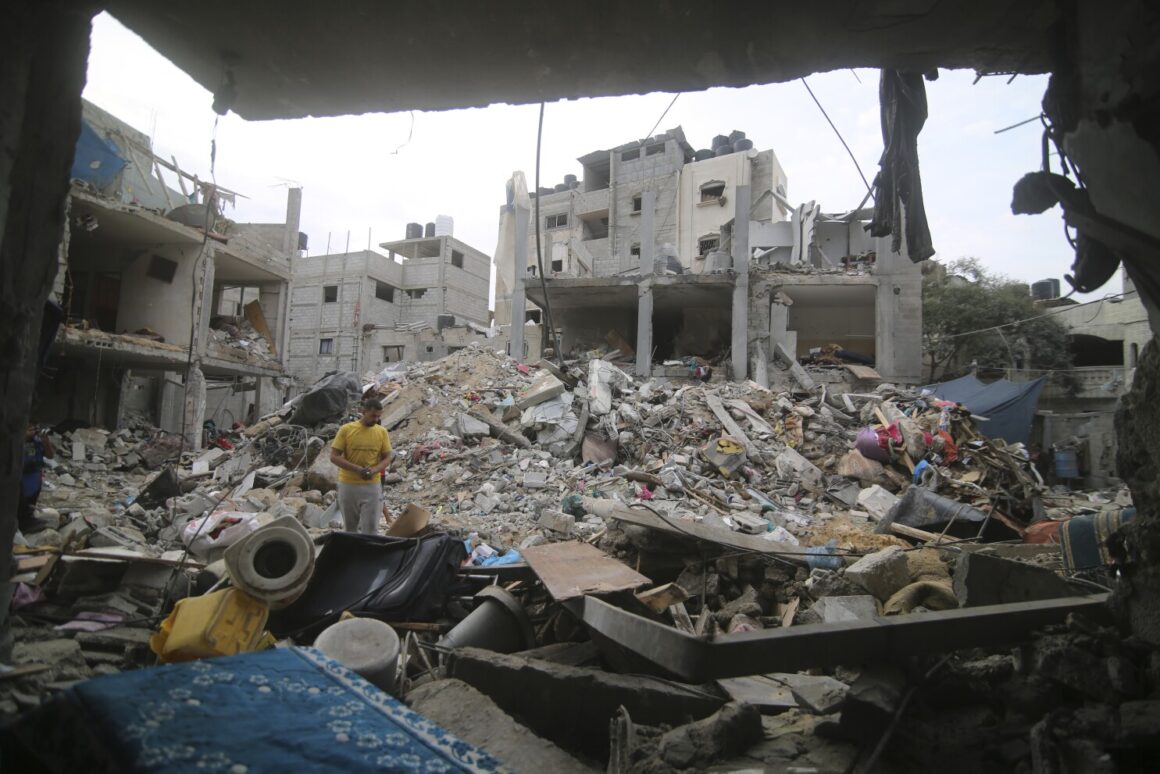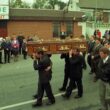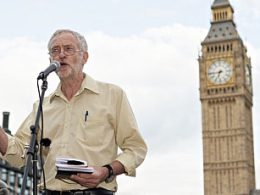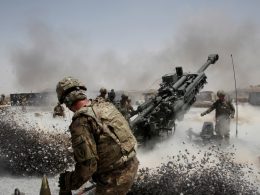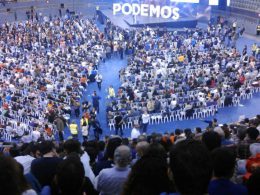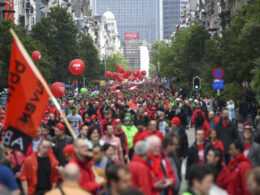By Neta Most, Socialist Struggle Movement (our sister organisation in Israel/Palestine)
The right wing government of Netanyahu, Ben-Gvir, and Smotrich has carried out political persecution and censorship since its inception. With the eruption of the war, this tendency has sharpened under the broadened government. Communications minister, Shlomo Deri, has taken steps aimed at imprisoning “citizens who undermine national morale”. In parallel, Deri, alongside the government Attorney General, introduced steps to shut down the Al-Jazeera station in Israel. This is part of an attempt to limit and censor media outlets who won’t fall in line with the government’s propaganda in regards to the war.
The government backing of far-right elements, especially in times of war, is expressed in public persecution and threats against voices critical towards the war, including journalists — Palestinians and others — such as the threats to physically attack independent journalist Israel Frey and his family. Newspaper editorials, publishers, and owners of the large media outlets, who themselves echo nationalist incitement and support for the war, are not the address for protecting journalists due to the growing pressures and political threats against some of them. In addition, the industry has been facing a growing job precariousness in the past few years — including layoffs at the ‘Yediot’ Group — which on its own adds to the pressure on journalists to self-censor. We need strong journalist organizations to fight these attacks.
We spoke with Ariel Gottlieb, a member of the Executive Board of the Union of Journalists in Israel (UJI), the United Committee of Journalists at Ynet and Yediot Ahronot, and a member of Socialist Struggle Movement (ISA in Israel/Palestine), about these developments, the role of organized labor in the industry during the war, as well as the layoffs at the ‘Yediot’ Group (in personal capacity).
Journalists often find themselves at the frontlines of the war. We also know about specific journalists that you work with who were murdered.
Yes, one photographer from the Ynet editorial, Roee Idan, and his wife were murdered at the Kfar Aza Kibbutz on the first day of the war. His little girl is unaccounted for. Other journalists have risked their lives, especially in the first days of the war, and others simply work around the clock.
Four additional journalists were killed on the first day of the war during Hamas’ attack in the south. Since then, 21 journalists have been killed in Gaza — more than the combined number of journalists killed in Gaza since 2001. A Reuters photographer was also killed in a bombing in Lebanon.
Alongside the immediate physical threat, there is now an atmosphere of nationalist witch hunt at workplaces and schools, particularly aimed against Arab-Palestinian workers or students. Is this persecution felt in the journalism field?
Even if there is no physical attack against journalists, we do face disruptions and harassments. The government has intentionally created a public atmosphere that makes it very difficult for journalists to do their job, and creates a trend of close supervision to ensure that journalists only report on what the official line is. We’ve seen these things before: during past war escalations and during the mass protest movement in Israel this year. But of course, now it is done on a much higher level.
Those who face the harshest treatment are the foreign media outlets, especially the Arab-speaking media who still operate here. The UJI has sent a letter to the government media department which is responsible for ensuring foreign media are able to do their job, demanding to protect their rights and defend them.
The situation has escalated sharply with the attempts of communications minister, Deri, to shut down Al-Jazeera’s local branch.
I think that in addition, there is a far wider influence here: journalists think twice about what they write, what they say on air, sort of a self-censorship which flows from acknowledging the new situation. I assume that Palestinian journalists in Israel feel this a lot stronger, as are Jewish journalists who are more critical towards the interests of the Israeli government.
In order for journalists to be able to report on the war in a more honest way, without self-censorship, we need strong organized labor in the industry — first to ensure employment and rights for journalists and other media workers, and in this context also defend journalists’ work environment against government pressures.
As part of government threats, far-right activists also threaten freedom of press. Among others, ‘La Familia’ (far-right supporters of Beitar Jerusalem Football Club) organized a “protest” on Saturday night, October 14th, with fireworks in front of the independent journalist Israel Frey. He was forced to flee with his wife and children and hide in a secret location. The UJI hasn’t yet commented on this or other journalists’ persecution. Isn’t this an issue which the union should make a statement on?
A statement hasn’t come out yet by the union, the executive board is discussing it and I was definitely among those who supported publishing a public statement. The allegation that Frey was persecuted because he supported Hamas is completely unacceptable, he simply made a basic empathetic comment about the tragedy children from both sides face.
This is a very extreme situation, that even for such a comment you can be threatened and experience persecution that puts your life in danger. I absolutely think that we need a clear statement from the UJI about this specific case, especially because it provides a dangerous precedent: If we don’t try to protect Frey now, more journalists and their families can face the threat of physical attacks in the hands of far-right activists.
If the union doesn’t put together a statement, as was the case with other controversial political issues, then we might put together a statement signed only by some of the executive board members to ensure that there is at least a clear statement, even if not under the official union’s name. The same goes for the Israeli bombings of journalists who were killed while doing their job in Gaza and Lebanon.
Alongside the different threats taking place during this war, does the ‘Yediot’ management continue the consolidating plan, which includes cuts and layoffs, despite the war?
The workers work a lot harder right now compared with before the war, whether it’s workers in the frontlines or those on the news or filling in for other workers, everyone is working a lot harder and they are required to make bigger sacrifices. But management wasn’t willing to consider any of this, even on the basic level of saying “ok, we won’t continue the plan right now”.
In fact, part of the plan has already been carried through, because they initiated a plan of alleged self-retirement. I say alleged because people don’t want to leave, but they are under pressure and insufficient compensation.
They’ve continued pressure in talks they had with workers where they encouraged people to leave, even when it wasn’t worth it. So many people left or about to leave under pressure.
They scheduled two negotiating sessions with the union before the war as preparation for layoff hearings, and then we appealed to them to suspend this process until the situation got clarified. They didn’t even agree to suspend it, and when we saw that they initiated hearings over Zoom instead of meeting in-person, we let the workers know that we decided not to participate.
You said earlier that attacks by both the government and the far-right is something that hurts the journalists’ work environment. In addition to the official line presented by the corporate media and the phenomenon of “enlisted media” which already distorts what’s happening, journalists enact self-censorship, especially during wartime and in terms of what’s happening “on the other side of the fence”.
Correct. It’s true in terms of what is presented to the Israeli public, and in terms of what will happen if they shut down Al-Jazeera in Israel: It means that international Al-Jazeera viewers won’t be exposed to some aspects of the war’s impact on Israeli society. In any case there is an attack on the ability to receive a broader and more honest picture of the facts. This shows again that truth is the first casualty in war.
Not long ago there was a declaration by the Palestinian unions which called to end Israeli bombings on Gaza, also signed on by the Palestinian journalist association. Did any foreign journalist union approach the UJI regarding this?
I’m not aware of any attempts to approach us, if there were any they probably went to the union’s chairperson or president, we haven’t received any message about it. In any case, developing a discussion and collaboration between the UJI with other unions, from the local level and internationally, can only be a useful, definitely if it includes the Palestinian journalist union.
I definitely agree with the calls to take a stand and an action against the bombings in this difficult crisis. The UJI has a trend where even those who might agree around different political issues refrain from taking a clear official position out of will to represent all journalists, including those of more more right-wing views. I think that in this situation we need to find ways to provide rank-and-file members a way to discuss political issues and express their opinion. I’ve said the same in connection to the discussion within the union regarding the protest movement against the “Judicial Coup”.
The fact that there are disagreements or different opinions is not a reason to avoid expressing opinions or have a discussion. On the contrary, it is precisely the reason to have that discussion and form a position which presents the interests of the journalists and of workers in general, in regards to political questions, such as the issue of the war, which is a critical issue for the workers who live here.





